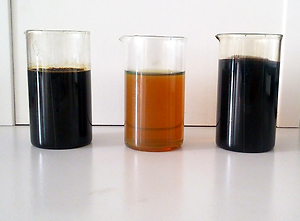Current issue
Online first
Archive
About the Journal
Aims and scope
Publisher and Editorial
Advertising policy
For Authors
Paper review procedures
Procedures protecting authentic authorship of papers
Paper preparation manual
Plagiarism check
Publication ethics
Reviewers
APC
Editorial and Scientific Board
Contact
Reviewers
Aging of engine oils and their influence on the wear of an internal combustion engine
1
Faculty of Civil and Transport Engineering, Poznan University of Technology, Poland
Submission date: 2021-03-18
Final revision date: 2021-05-21
Acceptance date: 2021-05-23
Online publication date: 2021-05-24
Publication date: 2021-07-01
Corresponding author
Marek Idzior
Faculty of Civil and Transport Engineering, Poznan University of Technology, pl. M. Sklodowskiej-Curie5, 60-965, Poznań, Poland
Faculty of Civil and Transport Engineering, Poznan University of Technology, pl. M. Sklodowskiej-Curie5, 60-965, Poznań, Poland
Combustion Engines 2021,185(2), 15-20
KEYWORDS
TOPICS
ABSTRACT
New designs of internal combustion engines require the use of engine oils that can cope with more demanding conditions, primarily with greater loads and higher temperatures. The requirements of recent years have led to a wider use of modern base oils and specially designed additive packages. This avoids the formation of impurities and changes in viscosity as a result of shearing of the viscosity additives under high loads. The article discusses the important problem of oil aging during operation and the impact of this phenomenon on the operation of internal combustion engines. The influence of oil service life and its replacement on the emission of toxic exhaust gas components was discussed, and the results of research on the effect of oil service life on changes in their viscosity were presented.
REFERENCES (15)
1.
AHMED, N., NASSAR, A. Lubricating oil additives. Egyptian Petroleum Research Institute. 2011. https://doi.org/10.5772/22923.
2.
ANDREWS, G., HALL, J., RAHMAN, A. et al. The influence of an on line heated lubricating oil recycler on emissions from an IDI passenger car diesel as a function of oil age. SAE Technical Paper 2000-01-0232. 2000. https://doi.org/10.4271/2000-0....
3.
DEVLIN, M.T. Common properties of lubricants that affect vehicle fuel efficiency: A North American historical perspective. Lubricants. 2018, 6(3), 68. https://doi.org/10.3390/lubric....
4.
ANDREWS, G., ABDELHALIM, S., LI, H. The influence of lubricating oil age on oil quality and emissions from IDI passenger car diesels. SAE Technical Paper 1999-01-1135. 1999. https://doi.org/10.4271/1999-0....
5.
IDZIOR, M. Nowe metody rozwiązywania problemów współczesnych silników o zapłonie samoczynnym. Zeszyty Naukowe Instytutu Pojazdów Politechniki Warszawskiej. 2007, 3(66), 5-21.
6.
IDZIOR, M. Badanie wpływu przebiegu pojazdów na zmiany właściwości olejów silnikowych, Autobusy. 2016, 6.
7.
IDZIOR, M., WICHTOWSKA, K. Badanie wpływu przebiegu pojazdów na zmiany właściwości olejów silnikowych. Autobusy. 2016, 6.
8.
JEFFERD, K., ROGERSON, J., COPP, D. et al. The impact of lubricants on heavy duty diesel engine fuel economy and exhaust emissions. SAE Technical Paper 2000-01-1983. 2000. https://doi.org/10.4271/2000-0....
9.
LECHNER, G., KNAFL, A., ASSANIS, D. et al. Engine oil effects on the friction and emissions of a light-duty, 2.2L direct – injection – diesel engine. Part 1 – engine test results. SAE Technical Paper 2002-01-2681. 2002. https://doi.org/10.4271/2002-0....
10.
MANNI, M., FLORIO, S., GOMMELLINI, C. Impact of fuel and oil quality on deposits, wear and emissions from a light duty diesel engine with high EGR. SAE Technical Paper 2000-01-1913. 2000. https://doi.org/10.4271/2000-0....
11.
MAMGBI, R., CERNY, J., BARIFAIJO, E. Time of exploitation and detergency properties of low SAPS engine oil. Nafta-Gaz, 2013, 69(1), 57-65.
12.
SMITH, T., KERSEY, V., BIDWELL, T. The effect of engine age, engine oil age and drain interval on vehicle tailpipe emissions and fuel efficiency. SAE Technical Paper 2001-01-3545. 2001. https://doi.org/10.4271/2001-0....
13.
TRIPATHI, A., VINU, R. Characterization of thermal stability of synthetic and semi-synthetic engine oils. Lubricants. 2015, 3(1), 54-79. https://doi.org/10.3390/lubric....
14.
SP399-B-Facts about engine oils. The University of Tennessee Agricultural Extension Service. SP399B-1M-11/98(Rev)E12-2015-00-066-99. http://trace.tennessee.edu/utk....
15.
ZWIERZYCKI, W. Płyny eksploatacyjne do środków transportu drogowego. Wydawnictwo Politechniki Poznańskiej. Poznań 2006.
CITATIONS (4):
1.
Analysis of lubricating oil degradation and its influence on brake specific fuel consumption of a light-duty compression-ignition engine running a durability cycle on a test stand
Rafał Sala, Kamil Węglarz, Andrzej Suchecki
Combustion Engines
Rafał Sala, Kamil Węglarz, Andrzej Suchecki
Combustion Engines
2.
Evaluation of the antiwear properties of timely changed engine oils
Daria Skonieczna, Oleksandr Vrublevskyi, Piotr Szczyglak
Combustion Engines
Daria Skonieczna, Oleksandr Vrublevskyi, Piotr Szczyglak
Combustion Engines
3.
Studies on Engine Oil Degradation Characteristics in a Field Test with Passenger Cars
Ruslans Smigins, Karlis Amatnieks, Aivars Birkavs, Krzysztof Górski, Sviatoslav Kryshtopa
Energies
Ruslans Smigins, Karlis Amatnieks, Aivars Birkavs, Krzysztof Górski, Sviatoslav Kryshtopa
Energies
4.
Emissions from Light-Duty Vehicles—From Statistics to Emission Regulations and Vehicle Testing in the European Union
Wiktor Pacura, Katarzyna Szramowiat-Sala, Janusz Gołaś
Energies
Wiktor Pacura, Katarzyna Szramowiat-Sala, Janusz Gołaś
Energies
Share
RELATED ARTICLE
We process personal data collected when visiting the website. The function of obtaining information about users and their behavior is carried out by voluntarily entered information in forms and saving cookies in end devices. Data, including cookies, are used to provide services, improve the user experience and to analyze the traffic in accordance with the Privacy policy. Data are also collected and processed by Google Analytics tool (more).
You can change cookies settings in your browser. Restricted use of cookies in the browser configuration may affect some functionalities of the website.
You can change cookies settings in your browser. Restricted use of cookies in the browser configuration may affect some functionalities of the website.



